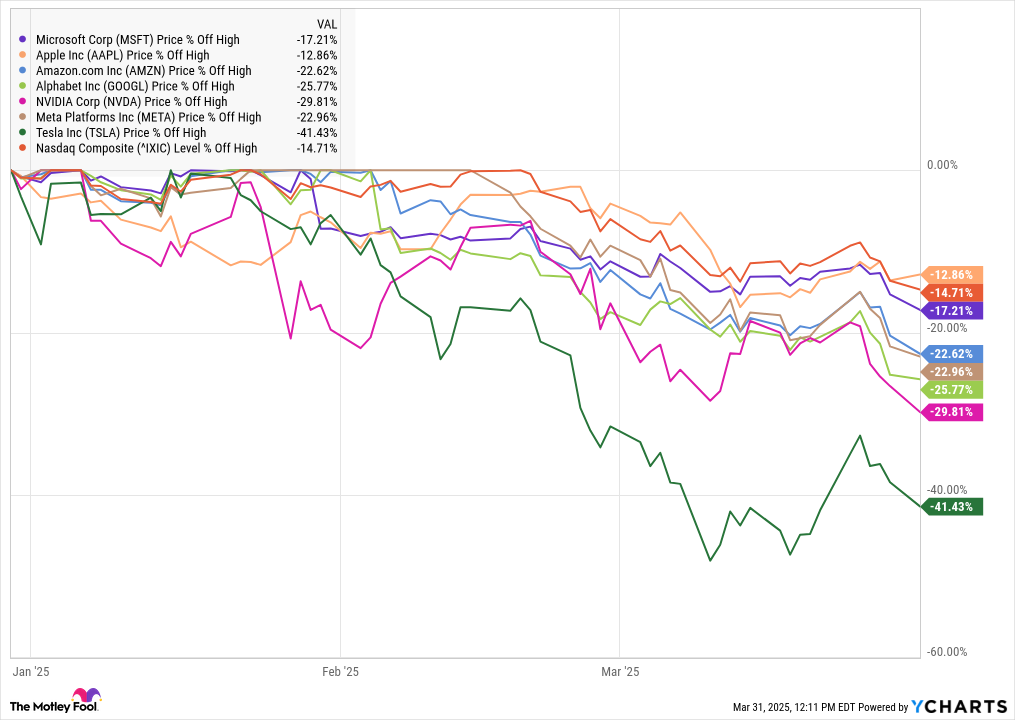The Nasdaq Composite, having recently approached its all-time high, is experiencing a significant decline, currently down about 15% due to concerns over new tariffs, weakening consumer sentiment, and geopolitical tensions. The so-called “Magnificent Seven” tech giants—Microsoft, Apple, Amazon, Alphabet, Nvidia, Meta Platforms, and Tesla—are facing average drops of 25% from their peaks. Investors fear a recession, leading to profit-taking from high-growth stocks. While past sell-offs showed these stocks rebounding post-correction, uncertainty remains about how deep or prolonged this downturn will be. Long-term investors are advised to hold their positions despite volatility.
Just a few weeks after nearing its peak, the Nasdaq Composite is experiencing a significant drop. As of Tuesday morning, the tech-driven index had decreased by approximately 15% from its all-time high, placing it firmly in correction territory.
Apprehensions regarding new tariffs, declining consumer confidence, geopolitical strains, and a stock market already trading at high valuations have prompted investors to take a defensive stance, offloading stocks, and questioning the duration of this market pullback.
The “Magnificent Seven” — a closely watched ensemble of tech giants including Microsoft (NASDAQ: MSFT), Apple (NASDAQ: AAPL), Amazon (NASDAQ: AMZN), Alphabet (NASDAQ: GOOG) (NASDAQ: GOOGL), Nvidia (NASDAQ: NVDA), Meta Platforms (NASDAQ: META), and Tesla (NASDAQ: TSLA) — have seen almost all of their stocks decline even further. These titans are down an average of 25% from their peaks in 2025, with Apple being the sole exception that has fared better than the Nasdaq.
During a widespread sell-off, growth stocks—often carrying high valuations—tend to be impacted the most. These are frequently the stocks that witnessed substantial gains in the preceding bull market, as investors’ concerns about a slowing economy and potential bear markets lead to profit-taking. Moreover, many of these top performers have cyclical exposure, and when economic challenges begin to mount, they are perceived as potentially overvalued.
Although investors tend to group these seven tech firms due to their immense size and overall market influence, their business models differ significantly, and they mostly operate in various subsectors of the tech industry. Consequently, they exhibit varying sensitivities to issues like tariffs or inflation.
As this correction unfolds, it is beneficial to reflect on recent history for insights on what investors might anticipate.
The last considerable sell-off in the tech sector and the wider market occurred in 2022 as the economy reopened, resulting in a decline for many tech stocks when investors recognized that the factors promoting their excessive growth during the pandemic were short-lived. Revenue growth decelerated dramatically for several leading tech companies, including Amazon, which saw a slowdown in both its e-commerce and cloud divisions, and Alphabet and Meta Platforms, whose digital advertising revenues decreased as consumers reverted to physical shopping and brand owners curtailed their marketing spending in anticipation of a possible recession.
